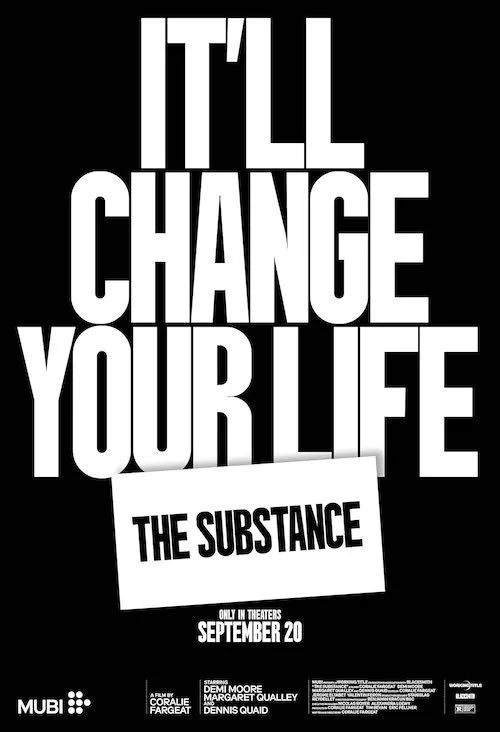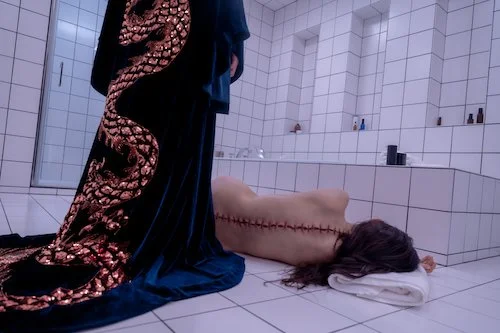The Substance
Written by Andreas Babiolakis
Warning: This review contains mild spoilers for The Substance. Reader discretion is advised.
I’ll never forget the unsettling image I had when I finally achieved my bucket list trip to Los Angeles and Hollywood, only to see the Walk of Fame look caked in filth and sludge. There is something so paradoxical about seeing these celebrity accolades just be trampled on, dirtied up, and disregarded: a dichotomy of the two sides of the industry, the city, and the society. On the other hand, there’s something surreal about what’s intended here: a small glimmer of love and appreciation for those who have moved or inspired us, and it can be found randomly as you walk aimlessly on a jam packed sidewalk that is trying to pull your attention every which way; for a microsecond, you are connected with the history and legacy of someone who truly made it. There’s beauty and ugliness, and they’re both doing the tango in the form of a tired yet noble sentiment.
Director Coralie Fargeat (Revenge) shares a similar mindset because her latest film, The Substance, has an introductory montage of the film’s core character Elisabeth Sparkle (Demi Moore) getting her star on the Walk of Fame being made, and the damage and neglect that ensues after the glitz and glamour are gone. This bird’s eye view of the star sees all that can happen to this star, and at first it felt like a symbol for Elisabeth’s legacy as an actor or celebrity, but by the end of The Substance, I saw the positivity in this moment: the resilience of an object that cannot be gaslit and tortured to the point of self sabotage (it will weather whatever comes its way, because it can; humans are often made to feel as though we cannot). Elisabeth’s legacy was already meant to be permanent. The crux of The Substance is that Elisabeth feels otherwise: as though she will be as good as dead as soon as Hollywood is done with her. Her paranoia leads us to The Substance: one of the great horror films of the twenty first century. It is as campy and satirically funny as it is authentically disturbing and nauseating; you may find yourself puking in your mouth right before another laughing fit erupts.
I was at an advanced press screening where only members of the industry were permitted, and even then I saw cinephiles — who have likely seen as many films as I have (and I’m well above ten thousand titles at this point) — having to turn away and even watch through their fingers at times; hell, some journalists needed brief breaks (we didn’t have any complete walk outs, mind you, because The Substance is too masterful to warrant that even at its most grotesque moments). If this film can get seasoned, desensitized people to respond in such a way, just believe me when I say that this film is fucked (which may be the selling point you needed to hear, mind you). Much of this success isn’t just what happens in a literal sense (don’t worry, I won’t have any blatant spoilers in this review), but how Fargeat sets up the entire film, even making the act of eating feel like the grossest activity in the world (with squishy noises, extreme closeups, and all the splatter that comes from chewing with one’s open mouth). All of these preliminary choices build towards a climax of atrocity, and yet I never truly felt like what I was seeing was disturbing.
Demi Moore delivers a career-best performance as Elisabeth Sparkle in The Substance.
Now, don’t get me wrong, The Substance on paper is truly one of the more disturbed films I’ve seen in years, but Fargeat achieves something extraordinary with this film. Like David Cronenberg accomplished with The Fly — where we sympathize with a transmogrified being to the point of tearing up — Fargeat has us finding beauty within the hideous: a deconstruction of society’s unrealistic, toxic, damaging standards in the face of the extreme. Where most films would focus on how unattractive they can get, Fargeat and The Substance try to see how far they can go and still have us finding pure, authentic gorgeousness within the very antithesis of what society tries to brainwash us with. Perhaps there’s sympathy and even empathy here, too, as we try to find the humanity within the abnormal, and this starts way before any explicit body horror imagery even takes place, all thanks to a highly clever premise that feels like the Twilight Zone episode, “Number 12 Looks Just Like You”, on steroids.
Elisabeth, we’re told, is a superstar of yesteryear who may even have an Academy Award under her belt; all we ever see is her Jane Fonda-esque fitness show, perhaps because she is so fixated on how she is perceived as a sex symbol that we don’t even get a chance to see who she truly is as an entertainer. She tries to feel positive about herself, but it is clear that she is “washed up” and this fear is confirmed when she overhears her boss, Harvey (Dennis Quaid), preparing to fire her due to her age (on her fiftieth birthday, no less, proving how transparent this decision is). Elisabeth drives home and is distracted by the unfortunately comparable image of her billboard poster being ripped apart, when she is hit by another driver. Miraculously, she is almost completely unharmed, and this catches the attention of a nurse who is tending to her; he slips her a USB key with information on it. This information is a breakthrough discovery: the ability to make a younger, perfect clone of one’s self through a mysterious formula known as the substance (we get a hint of that with the very first image we see: an egg yolk being cloned as our opening sequence).
After some consideration, Elisabeth bites the bullet and partakes in the experiment. She injects the serum into herself, and out of her back climbs her younger clone who will call herself Sue (Margaret Qualley). This casting feels highly appropriate and akin to what Birdman was saying about franchise stars and the Hollywood system. Moore has been worshiped and maligned by Hollywood (let me assure you that the Demi Moore renaissance is upon us after this film), while Qualley is the daughter of a similar actor, Andie MacDowell (who has defied conventional beauty standards by going grey and refusing to get work done); Qualley very much is the younger version of someone who fought the battle of the entertainment industry’s sexist standards and won. Moore took part in this fight as well and is appearing to come out on top years after the industry thought the coast was clear.
The catch of the substance is that the original person and the newly born clone have to live equally. Each body is awake for seven days before a swap is to be made (a blood transfusion that puts the awake body to sleep and jump starts the unconscious one). Any more, and the awake body will begin to malfunction, while the asleep body starves and deteriorates (the proper food and medication for each week is given to any test subject, so as long as they abide by the rules and timelines, both bodies should be able to survive normally). Things go well at first for both Elisabeth and Sue (mainly for the latter, who has become a direct replacement for Elisabeth as the face of a new exercise show that is now painfully geared to the perverted male gaze) until Sue gets that same addiction to fame that made Elisabeth want to undergo this procedure in the first place (to be young, hot, and relevant again). Sue begins to renege on the deal and stays out for longer than she is meant to while stealing the life force from Elisabeth’s body. As the film reminds us again and again, both Elisabeth and Sue are not two different beings, but, rather, two halves of the same being, and so both of their actions will have consequences that affect the other.
The Substance uses body horror elements to comment on the unfair standards women are meant to face in society.
I won’t get more into the plot of the film because the less you know the better. What I will dive into, however, is how this plot is told. Fargeat delivers an anxiety-riddled affair similar to Darren Aronofsky’s Requiem for a Dream, where the super fast cuts and extreme closeups both make us feel dread and point out the hypocrisies of shallow imagery in society (as we are bombarded with flashy advertisements that send our brains into over drive while making us feel like we’re less than dirt at the same time). The entire film is full of intrusive camera angles, unorthodox vantage points, and more, all meant to make us feel uneasy (until the breathy, comfortable Sue sequences begin, but those don’t get too much time to embrace the peace that permeates then before the horrors start for them too).
Another point is just how disgusting Harvey comes off because of how he is shot and presented in the film, with many unflattering closeups and effects to enhance his gross behaviour; he never is made to feel like he has to improve or change himself, whereas Elisabeth and Sue drive themselves to insanity to match the expectations of others. From the intrusive sounds and cuts to the judgmental aesthetics, The Substance is a body horror that takes place within the mind. This is a self-deprecating person beating themselves up to the point of illness. Despite the John Waters-esque satirization that takes place (down to the intentionally pornographic-sounding dialogue and acting, as to channel the hidden intentions of many of the men in the film), The Substance is tragic because you know there is true pain underneath the laughs and the shocks; campiness always comes from reality even at its most extreme. All of The Substance is full of cries for help. We listen from the very start. If only Elisabeth could hear and properly understand herself; she lets her addiction to fame get in the way of her own safety.
The Substance is equal parts horrifying, hilarious, and heartbreaking.
Fargeat’s direction and writing are fascinatingly strong here for the most part; I noticed upon reflecting why the nurse recommended this program to Elisabeth that there are layers to the story that beg for the film to be replayed because many early moments will be enriched with our knowledge of how the film transpires. There are only one or two plot points that don’t really add up to me (mainly, how does Sue move Elisabeth effectively without anyone noticing? You’ll know what I mean when you get there), but otherwise The Substance is razor sharp with both its commentary and its storytelling. Then there’s the heavy use of the colour yellow (and such a canary tinged hue at that) that represents the takeover of the substance throughout the film (and Elisabeth’s looming drive to begin the procedure, all tying back to those cloned yolks at the start of the film and the star on the Walk of Fame that followed). I could pinpoint every clever thing that can be found in this film, but I don’t want to spoil any more nor do I want to keep you here all day when there’s a spectacular horror film awaiting you.
All I will say is that my jaw was on the floor for this one. I could have sworn the film was going to wrap up at a certain point, and I kept feeling like it would conclude moments after it kept going towards new twists and ideas; my first inkling happened when there was still forty minutes left out of a total of two hours and twenty minutes. Don’t take this as a sign that The Substance is overlong (it is far from it); I just couldn’t predict where the film was heading for much of its runtime, and I love that. By the climax, one that is so twisted that I needed about an hour or two to really determine how I felt about it, we watch a body horror film experience its own version of body horror as it dismantles itself into a state of pure, psychedelic, abstract enormity. Our looks come and go, but our work will speak for itself long after we are dead. We need to realize this and stop punishing ourselves.
At the forefront of it all is Moore at her very best as Elisabeth, as her fears of aging are hyper realistic in tone. Moore also entertains the anguish and distress of another reality once she experiences her body horror torment, and you can tell her acting is coming from a very raw place: as if it is from decades of pent up anger towards the plethora of magazine headlines that aimed to destroy the very it girl that they once built (when all she wanted to do was act). While everyone in the film is great, Moore is on another level with a horror performance for the ages: one that will make you connect with her as much as you get distanced by her toxicity and cynicism. With all of this in mind, I sadly feel like the awards season will be too cowardly to honour The Substance with any trophies despite how many it deserves (especially for the mind boggling makeup work that truly needs to clean up the category at every single ceremony, if they’re willing to accept the film, that is).
The tagline for The Substance is “It will change your life” (a clear warning that there are negative connotations that are irreversible), but I honestly feel like the film will have insanely positive results on much of its viewing audience. Despite not being female, I felt like I was watching myself at times when I saw Sue punishing Elisabeth. I keep pushing my body to do things as if I was a teenager again, only to regret my choices the next day. We’re all guilty of this, rather than embracing and accepting ourselves at whatever age we presently are. I feel like I finally heard my body’s many warnings during this film and saw what my inner, younger spirit was doing to my older, fleshy vessel. I need to take better care of myself, as my mind and body are one. Elisabeth and Sue are one as well, and yet they only look out for themselves, resulting in the sickness of both. Of course, the film is more about the expectations women face on a daily basis to the point of self hated, but I think anyone can find themselves in a film this vulnerable. Not only is the horror in The Substance within us, we’ve allowed society to let it happen. The Substance is an effective, cogent look at how we look at ourselves and others, and it’s a crucial cautionary tale for the twenty first century. I feel like its aesthetic, style, message, and unorthodoxy will cement The Substance as a favourite for horror fans for years to come. Expect to hear about it time and time again.
Andreas Babiolakis has a Masters degree in Film and Photography Preservation and Collections Management from Toronto Metropolitan University, as well as a Bachelors degree in Cinema Studies from York University. His favourite times of year are the Criterion Collection flash sales and the annual Toronto International Film Festival.









